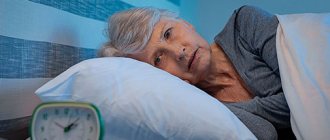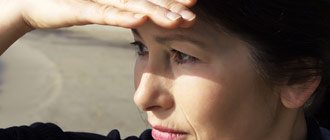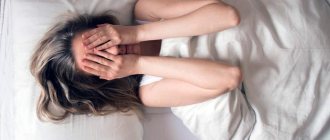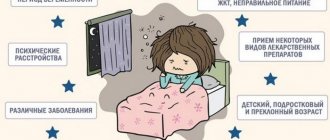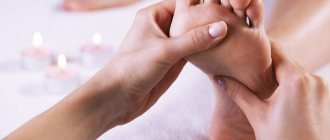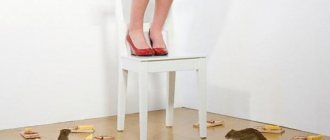The duration of sleep is individual for each person.
It also depends on age characteristics.
Young children sleep up to 14 hours a day, and in old age, rest time is sharply reduced. This is due to various factors.
If a person feels normal after 6 hours of sleep and is alert during the day, then this situation is normal for him and does not require treatment.
But when he wakes up exhausted, cannot sleep until the morning, and experiences constant drowsiness during the day, this indicates insomnia.
Treatment of pathology in the elderly has its own characteristics and must take into account the specifics of the aging body. We will talk about effective remedies for insomnia in older people in this article.
The benefits and importance of healthy sleep in old age
Sleep is of great importance to the health of all people. It is especially important in old age, and here's why:
• Lack of sleep increases the risk of heart attack and stroke; • During the night's rest, the body recovers; • Sleep strengthens the immune system - insomnia weakens the condition of an elderly person; • Sleep maintains healthy body weight; • During sleep, blood pressure normalizes, this is especially important for hypertensive patients; • Sleep calms and relieves stress.
Insomnia can cause significant harm to both the physical and mental health of a person and aggravate his sick condition. Healthy sleep, on the contrary, promotes health and strengthening, so in case of disturbances it is important to restore it.
Insomnia medications for older people
Medicines are used only if compliance with general recommendations, correction of diet and nutrition do not produce results. Sleeping pills are used with extreme caution:
- only with diagnosed insomnia (sleep disturbances recur for a long time and negatively affect the patient’s physical and mental state);
- the minimum effective dosage is prescribed;
- therapy is intermittent. Taking the drug is allowed 2-3 times a week (not daily). Courses of treatment are short, do not exceed 3-4 weeks;
- monitoring the condition while taking the drug, gradually reducing the dosage immediately after receiving the result.
If sleep disturbances are secondary, caused by some underlying disease, therapy is aimed primarily at treating it. For primary disorders, medications are prescribed taking into account exactly what problem is causing insomnia. For muscle spasms, tranquilizers can be effective; for apnea, cyclopyrrolones are more often used.
When prescribing any psychoactive, sedative and other drugs to elderly patients, the dosage is reduced as much as possible, taking into account age and health status. You cannot independently increase the dosage or duration of the course - this is dangerous for the development of drug dependence and a negative impact on cognitive functions. With long-term continuous use of certain sleeping pills, concentration, attention, and thinking may decrease.
Causes
Insomnia is a systematic sleep disorder in which waking up, falling asleep, depth and duration of sleep are disrupted. In the elderly, there are two types of insomnia: transient (caused by stressful situations) and chronic (permanent, due to physiological changes in the body). Typically develops after age 60.
Insomnia is considered to be not only long periods of sleep and shallow sleep, but also frequent awakenings at night with a lack of vigor in the morning.
Chronic pathology does not occur quickly. It is preceded by long-term processes: the development of diseases, long-term stress, regular violations of hygiene and sleep patterns.
The causes of insomnia in older people are associated with a decrease in the production of melatonin (sleep hormone) in old age.
A decrease in this hormone is caused by:
• Experiences that make it difficult to sleep: thoughts about loved ones, illness, pensions, lack of funds, memories of the past; • Poor sleep hygiene: uncomfortable bed, light and noise in the room. For healthy sleep, you need a quiet and peaceful environment without light or noise; • Diseases: asthma, hypertension, tachycardia, diabetes, osteoporosis and others - you must be treated by a specialist; • Mental disorders: depression, anxiety, chronic anxiety, schizophrenia, neuroses, nightmares. Psychological problems may also arise: fears of poverty, death and others. Specialists will help a person cope with mental illnesses and serious problems. If an elderly person is experiencing a temporary problem, he needs someone to open up to and have a heart-to-heart talk with; • Chronic pain and fatigue; • Taking energy drinks and certain medications that cause insomnia. In this case, the attending physician prescribes the dosage or changes the treatment regimen; • Sedentary lifestyle and excess weight. The lack of physical activity can be compensated for by special exercises, regular walks, and household work; • Snoring, convulsions, trouble breathing. You need to contact a specialist to solve the problem; • Bad habits: violation of a healthy sleep schedule, drinking alcohol before bed, falling asleep while watching TV. Menopause and postmenopause in older women. These conditions can cause night sweats and hot flashes, making women's sleep interrupted. This sleep pattern may persist during postmenopause. Exercise and diet will help overcome the problem; • Lack of sunlight. Sunlight regulates the production of melatonin, so older people benefit from walking in good weather.
Why do sleep problems occur?
There are two categories of violations.
Primary. Most often this is sleep apnea, which is manifested by short breath holds. Because of them, a person wakes up and then cannot fall asleep. The older you are, the more often such disorders occur. Their risk is higher in overweight people who are prone to snoring for a long time. In other cases, myoclonus (convulsions, muscle twitching), restless leg syndrome (trembling) interferes with sleep.
Secondary. They arise due to neurological, mental disorders, and some somatic diseases. These could be heart problems (frequent attacks of angina at night), bronchial asthma or COPD, pain syndromes, endocrine pathologies. If sleep disorders are associated with physical well-being, the person sleeps superficially, often wakes up, but can then fall asleep. With neurological problems, difficulties may arise both in falling asleep and in maintaining sleep. In two thirds of cases, secondary disorders are associated with mental disorders: depression, neuroses, dementia, high levels of anxiety, etc.
More often than not, sleep problems have several causes. For older patients, this may include an iatrogenic factor—taking medications that cause insomnia. Among these drugs are antidepressants, nootropics, antiarrhythmics, antihypertensives, bronchodilators, etc. Insomnia can be caused by their overdose or side effects.
The task of a gerontologist, psychiatrist or therapist when working with an elderly person is to collect as much information as possible about how insomnia manifests itself and what features it has in a particular case.
It is important to determine its root cause. In diagnosis, it matters what time a person falls asleep, whether he wakes up at night, how long he sleeps continuously, what his dreams are like, and how he himself assesses sleep productivity. The nature of the disorders and their possible causes allow us to select the most effective method of therapy. You have questions?
We will call you back within 30 seconds
or call the number
Clicking the "Submit"
, you automatically consent to the processing of your personal data and accept the terms of the User Agreement.
Typical sleep disorders
Insomnia can be associated with various disorders. The following are common in older people:
• Insomnia due to medication. For example, some drugs cause nightmares. Diuretics taken at night may cause interrupted sleep. Expectorants can prolong the time it takes to fall asleep. If you have such a problem, you need to tell your doctor about your sleep disorder. Perhaps he will change the treatment regimen or suggest a different drug. • Periodic limb movement syndrome. Sleep disturbances in the elderly may be accompanied by various leg movements during sleep. For example, a person periodically bends his big toe and the leg itself at the knee. • Restless legs syndrome. This sensation is similar to the feeling of running on a surface. Improving lifestyle and increasing physical activity help get rid of the syndrome. • Insomnia syndrome due to depression. The problem is accompanied by a feeling of emptiness, anxiety and early rises, after which the person cannot fall asleep.
General recommendations
The disease definitely needs to be treated. But we strongly advise against doing this with the help of sleeping pills! It is better to try to make the body want to sleep without drugs, so that the desire turns out to be natural.
Doctors often advise not to sleep during the day (yes, this is usually useful, especially for older people, but with insomnia it’s quite the opposite). If daytime sleep cannot be excluded, physical activity after it is strongly recommended.
You should establish a daily routine and strictly adhere to it.
Despite the recommended physical activity, you should never strain your nerves. They should be in comfort and coziness. If possible, go to the village, where it is fresh and nice.
If you have bad habits - smoking, drinking alcohol, not to mention something more serious - it is strongly recommended to get rid of them as soon as possible. This will help not only against insomnia.
Types of insomnia
• Insomnia. A person cannot fall asleep for a long time, sleep is short. Often occurs due to stress. To solve the problem, you need to stabilize your emotional state. The treatment is carried out by a psychotherapist. • Parasomnia. Occurs during sleep phases. A person wakes up several times during the night. May occur due to sleepwalking, enuresis, fear, epilepsy. • Hypersomnia. A person needs a long rest: the need for sleep can be up to 20 hours. At the same time, the feeling of cheerfulness does not always occur. It often develops in people who experience stressful situations and do not get enough sleep.
Insomnia in old age must be treated, otherwise it can lead to serious consequences - chronic pathologies. For treatment, you can first go to an appointment with a therapist, who will give directions to the right doctors. A narrow specialist in the field of sleep is a somnologist.
The diagnosis involves a detailed examination and examination of the patient to identify the causes of insomnia. The Epworth scale can be used as a diagnostic method. According to it, drowsiness is assessed from 0 to 4. The patient is interviewed and, depending on his answers, points are calculated, which determine the nature of the problem.
The “sleep diary” is also used in diagnosis. The patient needs to fill it out for at least a week. The diary describes in detail the person's sleep patterns. The diary is filled out in the morning and evening hours, describing each day. Thanks to this method, the doctor receives detailed data about the problem and can better study the disease.
Forms of the disease
According to the duration of the flow, they are distinguished:
- Transitional. Appears from time to time after stress, change of residence or excitement. Improvement occurs on its own, without taking medications.
- Chronic. The sleep disorder has been bothering me for more than a month and is accompanied by a pronounced decrease in vitality. Self-healing does not occur; to eliminate insomnia, medications with a hypnotic effect are needed.
According to medical statistics, almost half of those suffering from sleep disorders have:
We recommend reading! Click on the link:
Causes of insomnia in women, methods of prevention and treatment
- memory impairment;
- difficulty learning new information;
- anxiety;
- communication impairment;
- depression;
- prostration;
- daytime sleepiness.
Chronic asomnia leads to the fact that the central nervous system, which does not receive proper rest, works “to the limit.” The sad consequence of such an overload is mental disorders (found in 1/3 of patients with chronic sleep disorders) or the development of somatic diseases (the heart, blood vessels and musculoskeletal system are most often affected).
If an old man sleeps in fits and starts for more than a month, becomes irritable and complains of fatigue, then this is an alarming sign. This condition will not go away on its own; you need the help of a specialist.
Treatment
Treatment is carried out using different methods: medications, traditional medicine, and healthy exercises. Insomnia needs to be dealt with comprehensively.
Medicines
Insomnia medications are divided into prescription and over-the-counter medications. Many over-the-counter drugs are made from plants, and they are not addictive, but they are weaker than chemical-based drugs. In any case, taking any medications in old age should be agreed with a doctor.
A good medicine for insomnia should have these properties:
• Help you fall asleep quickly and easily; • Maintain healthy deep sleep without interruptions; • Do not cause feelings of lethargy, drowsiness and weakness; • Have few contraindications and side effects, and are not addictive.
Prescribed by prescription: Pagoklon, Zaleplon, Suvorexant, Indiplon and others. The dosage is minimal and should not be exceeded; the medicine is taken once a day. Treatment usually lasts two weeks - this will help avoid addiction.
Popular over-the-counter medications include: Novo-passit, Valerian tablets, Persen, motherwort tincture and others.
Let's take a closer look at several remedies that are used to treat insomnia in old age:
• Melatonin. A drug that contains an artificially obtained sleep hormone. Improves sleep for different types of insomnia, helps correct the body's biorhythms. Not addictive. The dosage is prescribed individually, the course of treatment is up to 20 days. • Andante. Capsules with sedative, hypnotic and relaxing effects. Suitable for severe cases. Take before bed, the course of treatment is no more than two weeks. • Zopiclone (Imovan). A drug with a sedative effect. Suitable for different types of violations. Prolongs sleep, reduces the number of awakenings, and improves the quality of night's rest. Take before bedtime. The course of treatment is no more than a month.
• Donormil. Used to treat periodic insomnia. Makes it easier to fall asleep and prolongs sleep. Take half an hour before bedtime, treatment lasts up to 5 days. • Novo-passit. Contains extracts of seven beneficial herbs that calm the nervous system. Thanks to this, a person quickly relaxes and falls asleep well. Used for mild insomnia. • Motherwort Forte. Calms against severe nervousness and emotionality, suitable for stressful situations. One tablet is taken in the morning and evening. Use with caution for people who have stomach problems.
Antipsychotics (for mental disorders) and antidepressants (for depressive conditions) may also be prescribed. Since older people have a slower metabolism, the doctor selects small dosages for them.
Hypnotics - sleeping pills - are often prescribed. Based on their duration of action, they can be divided into three groups:
• Medicines with a short duration of action – up to 6 hours. They relieve anxiety and facilitate the process of falling asleep; • Medicines with an average duration of action – up to 12 hours. These remedies help you fall into deep, uninterrupted sleep; • Long-acting medications – longer than 12 hours. Such drugs qualitatively improve sleep in old age. But they also have a side effect - drowsiness even after waking up.
Older people tend to wake up early. In such situations, medications with short-term effects will not be helpful.
Severe insomnia often accompanies dementia. The person cannot sleep at night, but experiences drowsiness during the day. In this case, a special approach to treatment is needed: a specialist selects funds and prescribes a course. You can only change your daily routine on your own so that a person has an active day and wants to sleep in the evening.
Insomnia medications can vary in strength and duration of action. Drugs that are acceptable in some cases are prohibited in other situations. Some drugs have serious side effects, negatively affect overall health and are addictive. Therefore, a specialist should prescribe medications and their dosage. Do not self-medicate.
ethnoscience
Folk remedies are a good and effective addition to traditional medicine. In the fight against insomnia, herbal preparations, decoctions, teas, and honey-based products are actively used.
Several recipes to choose from:
• Dissolve one spoon of honey in a glass of warm water or milk. Drink at night. • Pour one glass of bran into 100 ml of water, add 100 g of honey, mix everything. The mixture is taken 2 tbsp. l. during two months. • Mix equal amounts of calendula, motherwort, and thyme. Each time use 10 g of the mixture, pouring boiling water. The infusion takes 15 minutes to prepare. Add a spoonful of honey to the finished drink and drink before bed. • Mix valerian roots (5 g) and oregano (10 g). Boil the mixture for 15 minutes and drink at night. • One tbsp. l. Pour boiling water over valerian root, put on fire and cook for 15 minutes. Take 1 tbsp. l. once a day. • Drink based on lemon balm and mint. Mix one teaspoon of both components and brew with chamomile tea. Drink an hour before bedtime. • Pour 2 tsp. oregano with a glass of boiling water and leave for 20 minutes. Take 100 ml before each meal. • Pour 15 g of fireweed with water and cook for 15 minutes. Take 1 tbsp. l. before every meal. It is useful to brew and drink fireweed tea regularly. For example, 2 tbsp. l. You can add plenty of water and drink it throughout the day instead of the usual black. • One tbsp. l. Brew crushed strawberry leaves with one glass of hot water for 15 minutes. Add a spoonful of honey to the prepared tea. • You can use herbal baths. A warm bath is recommended 2-3 times a week before bed. Useful herbs for baths: mint, hops, wormwood, pine needles, linden. You can add honey and essential oils. • Decoction of hop cones. 1 tbsp. l. pour 2 cups of boiling water and cook over low heat for three minutes. Drink one cup after meals in the afternoon. • St. John's wort infusion. 1 tbsp. l. pour 3 cups of boiling water over the herbs and leave for at least two hours. After this time, strain and take three times a day in equal quantities.
other methods
The following methods are used to treat insomnia in the elderly:
• Massage of the collar area. Normalizes blood circulation, relieves muscle spasms, improves metabolism. • Electrosleep. A low-frequency current is transmitted to the patient through the electrodes, which creates a sleep effect. Thanks to this, the nervous system is restored, becomes calmer, and the inhibition process improves. Electrosleep is prohibited for mental problems. • Magnetic therapy. Magnets are attached to the patient's neck, which distribute a magnetic field. This field stimulates blood circulation in the capillaries, removes swelling, spasms, and inflammation. Thanks to this, sleep is normalized. • Hypnosis. The specialist uses special suggestion formulas that promote healthy sleep.
Disease or physiological feature
Those who have elderly relatives in their family are probably accustomed to the fact that old people often get up at night to drink water or go to the toilet, but at the same time they often forget themselves dozing for 10-15 minutes, sitting in a chair or lying on the sofa.
Despite the fact that such behavior seems to be an integral part of the aging of the body, doctors consider it a disease, and ICD codes have even been developed taking into account the individual characteristics of the course of the disorder:
- G9. Unspecified sleep disorder. This diagnosis is made to patients who cannot indicate the cause of the disease or the connection with external events. The code is also assigned to older people when, without additional examination, it is impossible to determine whether psychogenic or somatic factors provoke insomnia.
- F0. Insomnia of non-organic etiology. The old man does not have organic disorders that provoke sleep disorders, and frequent awakenings at night or reluctance to sleep at night are caused by psychological factors.
- G0. Difficulty falling asleep and maintaining sleep. Patients want to sleep, but when they go to bed, they cannot fall asleep, they toss and turn for a long time and begin to worry about what happened during the day. If falling asleep has occurred, then old people sleep lightly, awakening from quiet sounds.
Normalization of sleep is necessary. Sleep-deprived old people are depressed, grumpy and irritable. Often, senile insomnia becomes the reason that young relatives try to avoid communication with elderly relatives, limiting themselves to “duty” visits.
Rules for healthy sleep
Older age is not necessarily associated with sleep disturbances. Pensioners can also sleep well and soundly. To avoid insomnia, you need to follow simple recommendations:
• Learn to adhere to a strict regime in food intake, hygiene, work and rest. Regularity helps the body get used to a certain routine, and it adapts to changes more easily. So, if a person goes to bed at the same time, he will thereby make it easier for his body to fall asleep - he will already get used to a certain hour. • Introduce daily moderate physical activity. Walking and gardening are useful. This activity harmonizes the functioning of the entire body and saturates it with oxygen. As a result, sleep improves. • Organize the day so that it is eventful for the elderly person. By evening, fatigue will appear, and the person will easily fall asleep. It is not recommended to sleep during the day so as not to disrupt your sleep at night. • Follow the daily preparation for bed in the form of familiar rituals: airing the room, warm bath, herbal tea, reading at night. Such rituals have a double benefit: the body relaxes, and the brain understands that now is time to sleep. You need to refrain from drinking coffee, alcohol, and watching emotional films. The body should relax and tune in to rest. • In the evening, you can choose a monotonous hobby, for example, knitting. • Work on your nutrition. Your diet should include foods rich in protein and fiber. Dried fruits, boiled eggs, cottage cheese, baked fish and poultry are useful. Limit the amount of coffee, sweets and spices. Don't overeat in the evening. Dinner should be light and healthy. • In the evenings, breathing exercises, meditation, massage are useful. • Aromatherapy promotes relaxation and rapid sleep. A popular “sleeping pill” oil is lavender. It can be used as a bath additive or diffused indoors using an aroma lamp. • If a person is stressed, he needs to relax. To do this, you can take a herbal sedative. • The bed should be comfortable. Cotton bedding is suitable for older people. The mattress should be of medium hardness, the blanket should be light but warm. The bed needs to be made well to prevent lumps and creases from appearing - sometimes this is annoying and prevents you from falling asleep. A nightgown or pajamas should be loose and made of natural fabric. An elderly person's bedroom should be cool, quiet and dark.
These tips will help both during insomnia and as a preventive measure against it.
Coping with insomnia is not so difficult if it is not a consequence of illness. In this case, the root cause must be identified and treated. Treatment for insomnia should be comprehensive and individual for each person. It is important to start treatment on time and follow all medical recommendations and sleep hygiene rules.
Help from alternative medicine
Traditional recipes are a good alternative to medications.
To eliminate insomnia you should try:
- Honey water. Dissolve a tablespoon of honey in a glass of water and drink before going to bed.
- Kefir and honey. It is prepared in the same way as the previous recipe, only kefir is used instead of water.
- Collecting their thyme, motherwort and calendula. Take herbs in equal proportions, chop and mix well. Pour a tablespoon of the mixture into a glass of boiling water, and after cooling, strain the infusion and drink overnight.
You can brew valerian, motherwort, elderberry or hawthorn to improve sleep.
The advantage of folk remedies is that, compared to traditional medicines, they are less harmful to the body of an elderly person. But don't overuse it. If herbal decoctions do not help, then you need to visit a somnologist - long-term sleep disorder has a negative impact on your health.

